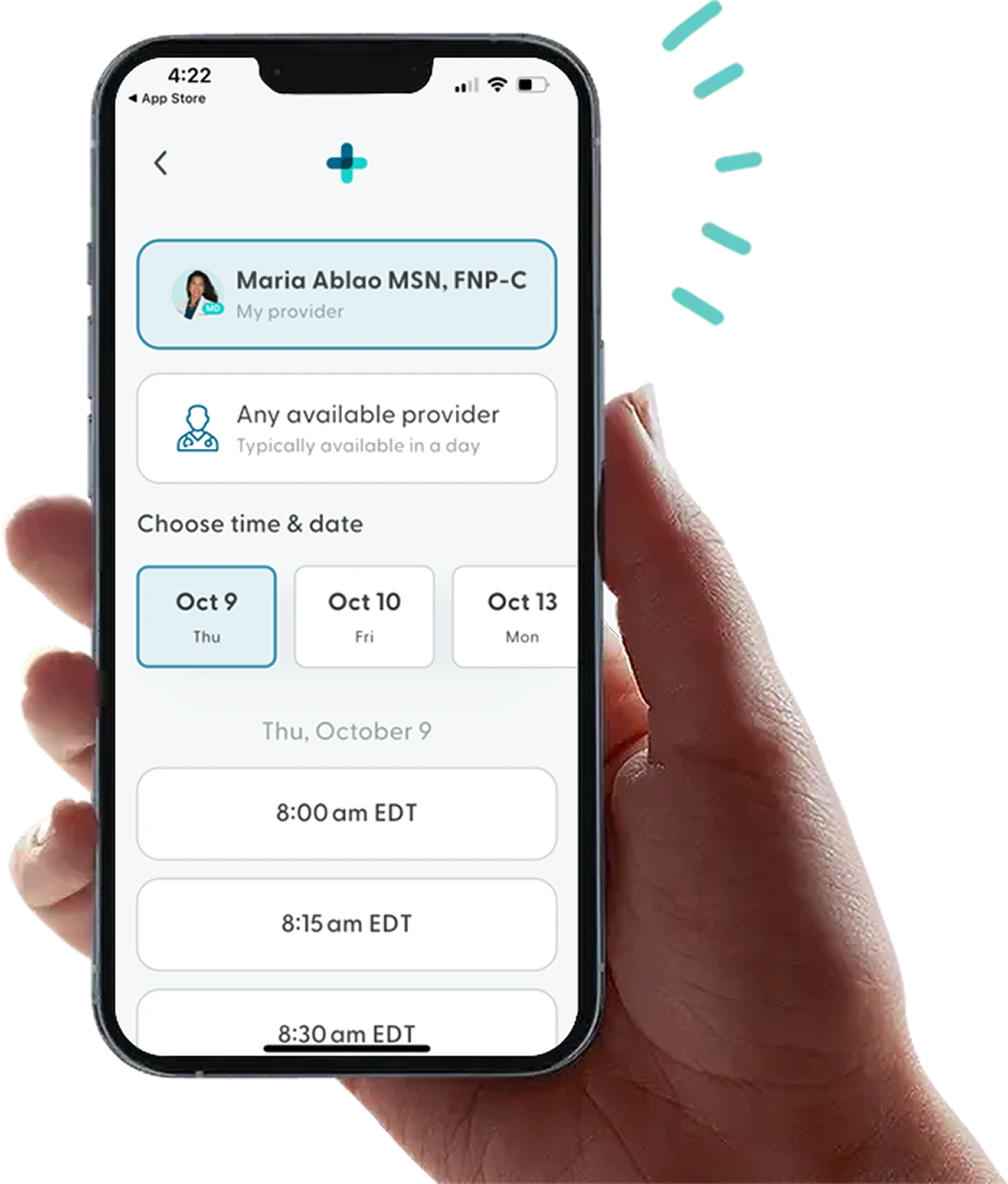Can Diabetes Be Reversed?
Diabetes is a chronic condition that affects how the body processes blood sugar (glucose). There are two primary types: type 1 diabetes and type 2 diabetes.
Type 1 is an autoimmune condition where the body cannot produce insulin while type 2 diabetes occurs when the body becomes resistant to insulin or doesn’t produce enough to maintain healthy blood sugar levels. Both types can lead to serious health complications – including heart disease, nerve damage, and kidney failure if not managed effectively.
When discussing diabetes "reversal," it usually refers to type 2 diabetes and means achieving normal blood sugar levels without ongoing medication. However, this isn't a cure, as symptoms can return if lifestyle changes aren’t maintained.
In this article, we’ll go over the different types of diabetes, if they can be reversed, and some tips for managing your diabetes diagnosis.
Understanding Type 2 Diabetes
Type 2 diabetes is a condition in which the body cannot use insulin effectively. This is known as insulin resistance. When the body's cells become resistant to insulin, the pancreas tries to compensate by producing more insulin. However, over time, the pancreas can't keep up with the demand, leading to elevated blood sugar levels. It's important to keep blood sugar within a normal range because high levels over time can damage organs like the heart, kidneys, and nerves.
Unlike type 1 diabetes, type 2 diabetes is typically linked to lifestyle factors and develops more gradually. There are several causes and risk factors that contribute to the onset of type 2 diabetes. The most significant include being overweight or obese, leading a sedentary lifestyle, and poor dietary habits.
Genetics may also play a role. A family history of diabetes can increase someone’s risk of developing the condition. Age and ethnicity – along with medical conditions like high blood sugar or high cholesterol – further raise the likelihood of developing the disease.
What Does Diabetes Reversal Mean?
When we talk about diabetes reversal, it generally means getting blood sugar under control without needing medication. In other words, through lifestyle changes like weight loss, diet, and exercise, someone’s blood sugar levels return to normal or pre-diabetic levels. However, this doesn’t necessarily mean that the person is "cured" of diabetes.
The difference between diabetes remission and reversal is important to understand. Remission means that a person with diabetes keeps their blood sugar at healthy levels without needing medication. This can be temporary or long-term – it all depends on how well lifestyle changes are maintained. Temporary remission might last a few months or years, while long-term remission is more stable but still requires ongoing focus on diet, weight, and exercise.
Reversal is sometimes used interchangeably with remission, but it doesn't imply a permanent state. For example, if lifestyle changes that improve blood sugar control are not sustained, the condition can return. Even with long-term remission, a person is still at risk of complications associated with diabetes.
So, is reversal a cure? No — while diabetes reversal or remission can significantly improve health outcomes and reduce the need for medication, it’s not the same as curing the disease. The underlying metabolic dysfunction that leads to diabetes still exists, meaning symptoms can reappear if old habits return or if the body’s needs change over time. Maintaining remission requires a lifelong commitment to healthy living, and regular monitoring is essential to prevent relapse.
Can Type 1 Diabetes Be Reversed?
Type 1 diabetes is an autoimmune condition in which the body’s immune system attacks and destroys the insulin-producing beta cells in the pancreas. As a result, people with type 1 diabetes cannot produce insulin and must rely on insulin therapy to regulate their blood sugar levels. Unlike type 2 diabetes, which can be influenced by lifestyle changes, type 1 diabetes is not caused by insulin resistance but by the loss of insulin production.
From a medical perspective, there is currently no way to reverse or cure type 1 diabetes. Insulin therapy remains the primary treatment, and while technological advancements – such as continuous glucose monitors and insulin pumps – have improved management, they do not eliminate the need for insulin.
However, ongoing research into potential treatments offers hope. Beta cell regeneration aims to restore the body’s ability to produce insulin by regenerating or replacing the destroyed cells. Another promising area is immunotherapy, which focuses on preventing the immune system from attacking the beta cells. While these treatments are still in the experimental phase, they represent a potential pathway toward future breakthroughs in managing or even reversing type 1 diabetes.
Can Type 3 Diabetes Be Reversed?
"Type 3 diabetes" is often used to describe the relationship between Alzheimer’s disease and insulin resistance in the brain, though it isn’t an officially recognized medical diagnosis like type 1 or type 2 diabetes. In this context, insulin resistance in the brain may contribute to cognitive decline, but it’s distinct from blood sugar management issues seen in other types of diabetes.
While there’s no way to reverse Alzheimer’s or other forms of dementia, health experts suggest that diet and mentally stimulating activities may help delay or prevent symptoms. A promising approach is the MIND diet (Mediterranean-DASH Intervention for Neurodegenerative Delay), which combines brain-healthy foods from the Mediterranean and DASH (Dietary Approaches to Stop Hypertension) diets.
This diet focuses on fruits, vegetables, fish, poultry, whole grains, and healthy fats like olive oil, all shown to reduce inflammation, protect brain cells, and potentially slow brain aging. Together, these lifestyle choices may help support brain health, even if a full reversal of symptoms isn’t yet achievable.
The Role of Weight Loss in Diabetes Reversal
Carrying extra weight, especially around the abdomen, can increase insulin resistance. Even a modest weight loss of 5-10% of body weight has shown to significantly improve insulin sensitivity, making it easier to manage blood sugar levels.
Studies have shown that losing weight, particularly through very low-calorie diets, can reduce fat buildup in the liver and pancreas. This helps restore these organs' normal function and enhances the body’s ability to regulate blood sugar levels.
Lifestyle changes that support weight loss and diabetes reversal
For many people with type 2 diabetes, weight loss serves as a central strategy for achieving blood sugar control and potentially reversing the condition. By losing weight, especially through sustainable lifestyle changes and – when necessary, medical interventions – it becomes possible to improve insulin sensitivity and restore more normal blood sugar levels. Here’s how weight loss can make an impact, and the different approaches that support long-term success in reversing type 2 diabetes.
Healthy diet choices
Opting for a diet rich in whole foods, fiber, lean proteins, and healthy fats supports both weight loss and blood sugar management. Low-carb, Mediterranean, and plant-based diets are commonly recommended, as they focus on nutrient-dense foods that aid in weight control without spiking blood sugar. These diets also help reduce calorie intake, which is essential for shedding excess weight.
Regular physical activity
Exercise complements dietary changes by promoting calorie burn, supporting weight loss, and improving insulin sensitivity. Aerobic activities, such as walking or cycling, and resistance training like weight lifting, have shown positive impacts on blood sugar levels. Regular physical activity not only aids in weight management but also helps control blood glucose and improve heart health.
Stress reduction and quality sleep
Chronic stress and poor sleep can increase levels of cortisol, which affects blood sugar and may lead to weight gain, particularly around the abdomen. Practicing stress-management techniques like meditation and getting consistent, restorative sleep are essential in supporting weight loss and insulin sensitivity.
Medical interventions to aid weight loss and diabetes management
When lifestyle changes alone aren’t enough to achieve meaningful weight loss or blood sugar control, medical interventions can offer additional support. From medications that aid both weight and glucose management to surgical options for those needing significant weight reduction, these treatments can be valuable tools in managing type 2 diabetes and promoting lasting health improvements.
Medications that support blood sugar and weight control
Some medications – such as GLP-1 receptor agonists – not only help regulate blood sugar but can also aid in weight loss. Other options, like metformin, are commonly used to help manage blood sugar, making it easier for individuals to follow their weight loss plan and achieve diabetes control.
If you’re looking for more information on healthy eating habits or want to learn about other ways to lose weight, LifeMD can help.
With the LifeMD Weight Management Program, you’ll have access to ongoing care from a team of licensed clinicians, along with groundbreaking GLP-1 medication, if clinically appropriate.
Just answer some questions about your medical history and your weight loss goals to find out if you qualify.
Bariatric surgery
For some individuals with significant weight to lose, bariatric surgery can be a viable option. The procedure has been shown to promote substantial weight loss and, in many cases, remission of type 2 diabetes. Bariatric surgery reduces the stomach’s capacity, leading to less food intake and promoting long-term weight loss, which can be particularly effective for individuals with severe insulin resistance.
Emerging treatments
Newer treatments – such as SGLT2 inhibitors and DPP-4 inhibitors – provide additional support for managing blood sugar levels and can aid those in their weight loss efforts. These medications are promising for those who need extra help managing their diabetes as they work toward weight loss.
Get prescription weight loss medication online.
Find out if you're eligible for GLP-1s, and get started on your weight loss journey for as low as $75/month.


Challenges in Reversing Diabetes
While diabetes reversal is possible for some, there are challenges that can make it difficult to achieve and maintain. Genetic factors play a role, meaning that even with lifestyle changes, some individuals may struggle to reach or sustain remission due to inherited traits that affect blood sugar regulation.
Additionally, there’s a real risk of relapse. Even after reaching remission, it can be hard to keep blood sugar levels in a healthy range without constant attention to diet, exercise, and other lifestyle factors. Lastly, the psychological aspects of managing diabetes long-term can be taxing. Staying motivated to make daily health choices and managing the stress of a chronic condition requires ongoing mental resilience and support.
The Role of Early Diagnosis and Treatment
Early management of diabetes is critical. Catching the condition at the pre-diabetes stage or soon after diagnosis increases the likelihood of controlling or reversing it through lifestyle changes. Taking proactive steps, like improving diet, increasing physical activity, and maintaining a healthy weight, can significantly impact long-term outcomes and reduce the risk of complications.
Living with Diabetes After Reversal
If you’re ready to take charge of your health and explore options for managing or even reversing type 2 diabetes, LifeMD is here to help. Through personalized care, expert guidance, and accessible telehealth services, LifeMD provides the support you need every step of the way. Connect with our team to create a plan tailored to your health goals and start your journey towards lasting wellness today.
Feel better with LifeMD.
Your doctor is online and ready to see you.
Join LifeMD for seamless, personalized care — combining expert medical guidance, convenient prescriptions, and 24/7 virtual access to urgent and primary care.

 Medically reviewed and edited by
Medically reviewed and edited by 
